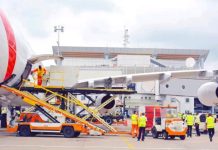Africa’s air cargo sector showed signs of struggle in May 2025, falling behind global trends despite a slight boost in capacity. According to the International Air Transport Association (IATA), African airlines experienced a 2.1% year-on-year decline in air cargo demand, even as available cargo capacity on the continent rose by 2.7%. This underperformance contrasts with the overall global cargo market, which grew by 2.2% in demand, with international operations expanding by 3.0%.
While carriers in Asia-Pacific led the global recovery with an 8.3% rise in demand, and the Middle East, Europe, and Latin America posted modest gains, African airlines lagged, pointing to deeper structural challenges. North American carriers recorded the weakest performance globally, with a 5.8% decline, driven by shifting U.S. trade policies and a sharp contraction in Asia–North America cargo traffic.
Despite these headwinds, global airfreight showed resilience. IATA’s Director General, Willie Walsh, highlighted that even with a 10.7% drop in Asia–North America traffic due to changing de-minimis exemptions and tariff front-loading, the sector adapted quickly by rerouting and reshaping cargo flows to maintain service. He praised the industry’s ability to manage shifting global supply chain needs under volatile conditions.
In terms of the broader economic context, air cargo demand outpaced both world industrial production and global goods trade. Industrial output rose 2.6% in April 2025, while air cargo volumes surged 6.8%, well ahead of the 3.8% growth in goods trade. Lower fuel prices provided some relief, with jet fuel costs in May falling 18.8% compared to the previous year and 4.3% month-on-month. However, global manufacturing activity remains weak, with the Purchasing Managers’ Index (PMI) slipping to 49.1 and export orders stuck in negative territory at 48, reflecting ongoing economic pressures.
The data raises critical questions about Africa’s positioning in the global air cargo network. While other regions are benefiting from demand rebounds and trade realignments, African carriers continue to grapple with issues such as limited connectivity, inadequate infrastructure, and regulatory constraints. With the African Continental Free Trade Area (AfCFTA) presenting new opportunities for intra-African trade, industry stakeholders may need to rethink cargo strategies to unlock the continent’s potential and reverse the current slide.
To remain competitive and seize emerging opportunities, African airlines must accelerate investments in modern logistics infrastructure, digital tracking technologies, and efficient customs processes. Enhancing regional and international cargo partnerships will also be essential if Africa hopes to turn its growing capacity into sustainable demand.













